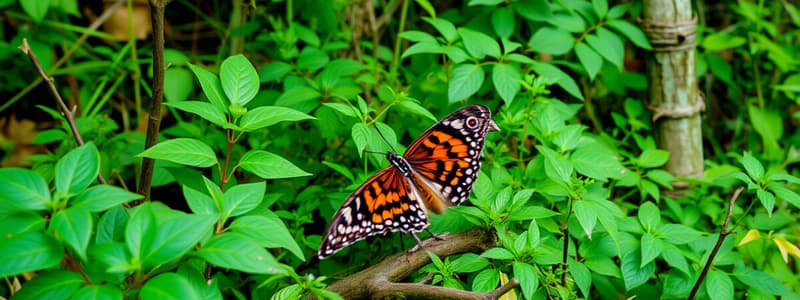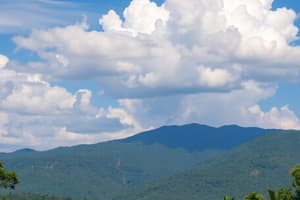Podcast
Questions and Answers
What percentage of India's geographical area is covered by forests and trees?
What percentage of India's geographical area is covered by forests and trees?
- 45.75%
- 15.25%
- 30.10%
- 23.39% (correct)
Which of the following is NOT a requirement for a region to qualify as a biodiversity hotspot?
Which of the following is NOT a requirement for a region to qualify as a biodiversity hotspot?
- At least 1500 species of vascular plants
- A high degree of species evenness (correct)
- Being recognized by Conservation International
- 70% of its original habitat
Which biodiversity hotspot has the highest number of endangered species in India?
Which biodiversity hotspot has the highest number of endangered species in India?
- Indo-Burma Region
- The Western Ghats
- The Himalayas (correct)
- Sundaland
Which mammal species has NOT been discovered in the Indo-Burma Region?
Which mammal species has NOT been discovered in the Indo-Burma Region?
How many plant species are endemic to the Himalayas?
How many plant species are endemic to the Himalayas?
What is the geographical coverage of the Indo-Burma Region?
What is the geographical coverage of the Indo-Burma Region?
Which of these bird species is included among the rich bird diversity of the Indo-Burma Region?
Which of these bird species is included among the rich bird diversity of the Indo-Burma Region?
Which of the following regions is NOT listed as a biodiversity hotspot in India?
Which of the following regions is NOT listed as a biodiversity hotspot in India?
Flashcards are hidden until you start studying
Study Notes
Biodiversity Overview
- Biodiversity refers to the variation of plant and animal species within a specific habitat.
- Major components include species richness (number of different species) and species evenness (distribution of species).
- India boasts rich biodiversity, with forests and trees covering 23.39% of its geographical area.
Biodiversity Hotspots Definition
- Coined by Norman Myers, "Biodiversity hotspots" are regions characterized by high species richness and endemism.
- Regions must meet two criteria to qualify as a hotspot:
- Must contain at least 1,500 species of vascular plants.
- Must retain 70% of its original habitat.
Major Biodiversity Hotspots in India
-
The Himalayas
- Largest mountain range globally, spanning North-East India, Bhutan, and parts of Nepal.
- Home to 163 endangered species, including the Wild Asian Water Buffalo and One-horned Rhino.
- Contains approximately 10,000 plant species, with 3,160 being endemic to the region.
- Covers an area of nearly 750,000 km².
-
Indo-Burma Region
- Encompasses a vast area of 2,373,000 km².
- Recently identified six new large mammal species, including the Large-antlered Muntjac and Saola.
- Renowned for its endemic freshwater turtle species, many of which face extinction due to over-harvesting and habitat loss.
- Hosts around 1,300 bird species, including threatened species like the White-eared Night-heron and Grey-crowned Crocias.
Studying That Suits You
Use AI to generate personalized quizzes and flashcards to suit your learning preferences.




